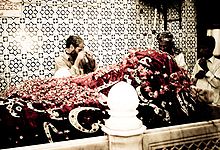- Abdullah Shah Ghazi
-
Abdullah Shah Ghazi (Arabic: عبد الله شاه غازى ) is considered to be patron saint of Karachi, Sindh, Pakistan. He is widely revered in Pakistan. His tomb is also a revered Sindhi shrine especially for the Bawarij Sindhi Muslims and the Samma tribe.
The Mausoleum and Dargah of Abdullah Shah Ghazi is located in Clifton[1] neighbourhood of Saddar Town in Karachi.
History
There are two versions about Abdullah Shah Ghazi.
The first version states that Abdullah Shah Ghazi was Syed Abu Muhammad Abdullah Al Ishtar from the lineage of the Prophet Muhammad from the linage of Hasan Ibne Ali Ibne Abu Talib[2]. According to historian Suhail Zaheer Lari, he was the son of Muhammad al-Nafs al-Zakiyya.[3] He was born in Medina in the year 720 and arrived in Sindh in the year 760 as a merchant and brought with him a large number of horses purchased from Kufa, Iraq. He was given a warm welcome as he belonged to a saadat family, the noblest in Islam.
The second version has been given by, Dr. Umar Bin Muhammad Daudpota proposes that the real name of Abdullah Shah was General Abdulla bin Nabhan. Who along with another senior commander, Badil bin Tuhafa, had launched a military expedition against the local ruler, Raja Dahir. The assault was a response to the activities of Raja Dahir, who was seen as encouraging pirates to raid Arab shipping. The war is generally attributed to being triggered by a noble woman who wrote to the then Governor of Basra, Al-Hajjaj ibn Yusuf, that she had been kidnapped. Al Hajjaj then wrote a letter to the Raja Dahir who replied that he did not exercise any control over pirates in his kingdom thereby triggering a military expedition that ensued at Debal, near modern day Karachi. Later, a second mission was entrusted to a young commander, Muhammad bin Qasim who successfully defeated the Raja and rescued the noble woman and the other muslim prisoners. This version is at odds with first, as it paints a picture of an Ummayad prince. Ummayyads persecuted the progeny of prophet Muhammad particularly the families of the imams in whom was vested religious authority which challenged the former's role as Kahalifas (Caliphs).
While Muhammad bin Qasim pressed on to topple the Raja and conquer, Abdullah Shah continued to live and preach Islam in Sindh. Beside preaching, Abdullah Shah was very fond of hunting. In old times, Sindh had plenty of wildlife like ibex, urial, blue bull, gazelle and deer. In his passion for hunting, Abdullah used to go far from the base and while he had was far enough away he was intercepted by the enemy. Out-numbered, he preferred to fight rather than submitting and it is because of this display of valor he was given the title of "Ghazi" meaning "victorious".
He died in the year 773 near the sea while dressed in war attire. He was buried at the present place, atop a hill in Karachi.
In December each year, a great festival is held at the shrine for 3 days marking the anniversary of Abdullah where Muslims from all factions come in large number. The festival is enjoyed even by some non-Muslim as the saint is revered by all for preaching love, tolerance and politeness.
Abdullah Shah Ghazi's shrine in Karachi is dated back to 1400 years ago, his brother, Syed Misry Shah, who is also buried along the coastline in Karachi, is also remembered as a saint.
Many people claim to have been granted their wishes at the shrine and it is the centre for people who throng the shrine all year round. Every year marks the Urs (festival) at the shrine for 3 days (dates: 20-22 Dhu al-Hijjah - 12th month of the Islamic calendar), marking the anniversary of Abdullah Shah Ghazi. A famous myth about the mazar is that Karachi never had a tropical disaster in a thousand year because of the shrine's blessing.
See also
- List of mausoleums and shrines in Pakistan
- Abdullah Shah Ghazi Mausoleum
- Muhammad ibn Abdallah aka Muhammad al-Nafs al-Zakiyya descendant of Imam Hasan ibn Ali.
References
- ^ Pakistan's mystical Islam thrives - BBC News
- ^ Official Website
- ^ Lari, Suhail Zaheer. A History of Sindh. Oxford University Press, USA. 1995. [and OUP Pakistan. 1996.]
Categories:- Pakistani Sufis
- Sindhi people
- Dargahs
- History of Sindh
- Karachi
- Umayyad Caliphate
- Sufi shrines in Pakistan
- Pakistani saints
- Burials in Karachi
Wikimedia Foundation. 2010.

